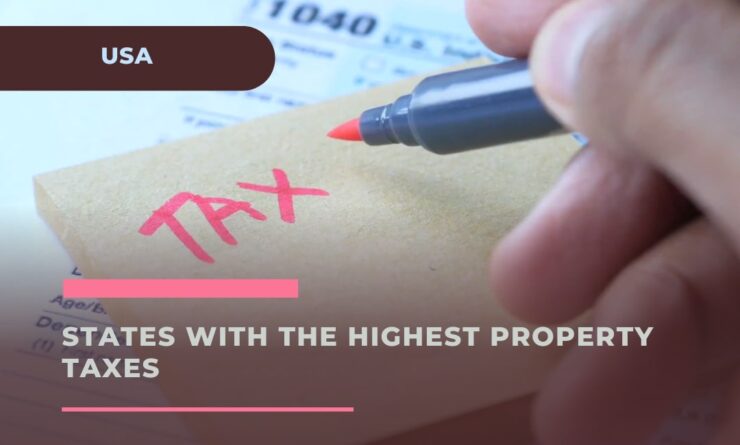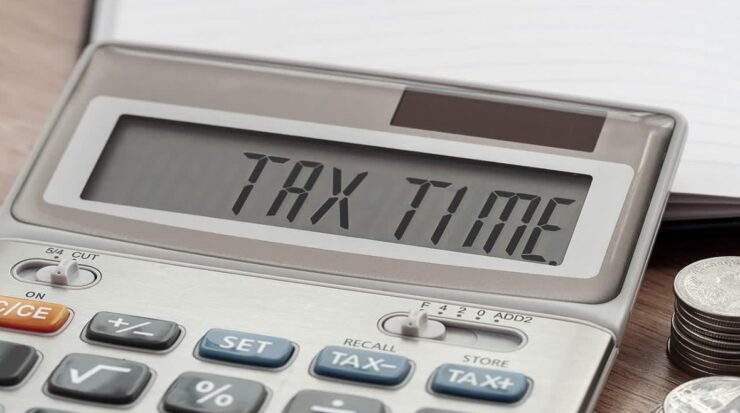In the vast tapestry of the United States, the cost of owning a home can vary drastically from state to state. In certain locales, the real estate market is as gentle as a lazy river, with modestly priced homes and property tax rates that barely make a ripple at less than half a percent. The annual property tax obligations here are often no more burdensome than a few hundred dollars.
Yet, there exist other regions where this tranquil river turns into roaring rapids. In these states, property taxes have soared, surpassing the 2% mark with ease. The real estate market is a veritable game of Monopoly, with home values reaching dizzying heights. In these domains, the average annual property tax bill doesn’t just creep but rather sprints, frequently reaching or exceeding the formidable $10,000 milestone.
A dive into the reservoir of data provided by the Tax Foundation, alongside our meticulous analysis, has led to a fascinating leaderboard. This leaderboard showcases the 15 states with the heaviest property taxes, ranked from those only slightly straining the wallet to those that demand a king’s ransom. These rankings consider the trifecta of factors: the percentage rate of property tax, the average dollar amount handed over annually, and the average value of homes in each state.
To provide a baseline, let’s peek at the national averages. Across the U.S, the typical effective property tax stands at 1.04%. The median value of an American home stands at a comfortable $349,015, while the average yearly property tax bill amounts to $3,630.
Now, let’s embark on this voyage through the landscape of American real estate, unveiling the states that demand the highest price for the privilege of home ownership. It’s a journey full of surprises and revelations, underlining the fact that, in the world of property tax, not all states are created equal.
Table of Contents
ToggleCities With Sky-High Taxes
Let us embark on an exploratory journey through the land of escalating property taxes, from the plains of Kansas to the shores of New Jersey.
Kansas
- Average effective property tax: 1.32%
- 2024 average home value: $210,447
- Average annual property tax paid:: $2,778
Our journey begins in Kansas, where the low hum of property taxes can be felt at 1.32%, a rate that’s deceptively gentle compared to the tumultuous taxation of states higher on the list. The median home price in 2024 is a comfortable $210,447, resulting in an annual property tax of $2,778.
New York
- Average effective property tax: 1.38%
- 2024 average home value: $370,445
- Average annual property tax paid:: $5,112
Venturing forth, we come upon a unique scenario, a tie between New York and Michigan. Both states boast an average property tax rate of 1.38%. However, New York emerges with a heavier tax bill of $5,112, courtesy of the higher average home value of $370,445.
Be careful as New York is full of very dangerous neighborhoods and places, stay safe.
Michigan
- Average effective property tax: 1.38%
- 2024 average home value: $228,708
- Average annual property tax paid:: $3,156
Michigan, in contrast, with an average home price of $228,708, commands a gentler tax of $3,156.
Rhode Island
- Average effective property tax: 1.43%
- 2024 average home value: $433,666
- Average annual property tax paid:: $6,201
Rhode Island, the tiny titan of the Northeast, comes in at twelfth. With a property tax rate of 1.43%, this diminutive state exhibits an average home value of $433,666, among the top three of our list, resulting in an annual property tax of $6,201.
Pennsylvania
- Average effective property tax: 1.49%
- 2024 average home value: $265,724
- Average annual property tax paid:: $3,959
The Keystone state, Pennsylvania, while bearing an imposing tax rate of 1.49%, displays an average home value of $265,724, yielding a surprisingly reasonable average annual property tax of $3,959.
Iowa
- Average effective property tax: 1.50%
- 2024 average home value: $197,330
- Average annual property tax paid:: $2,960
Crossing the Midwest, we find Iowa, where despite a steeper property tax rate of 1.5%, the modest average home value of $197,330 keeps the annual property tax payment relatively low at $2,960.
Besides there average home value, we have information that Iowa has beautiful nature, landscapes and animals on it’s land.
Ohio
- Average effective property tax: 1.58%
- 2024 average home value: $212,757
- Average annual property tax paid:: $3,362
Ohio, the Buckeye state, presents an interesting dichotomy. While its average effective property tax rate of 1.58% may seem daunting, its lower average home value of $212,757 keeps the average annual property tax at $3,362.
Nebraska
- Average effective property tax: 1.61%
- 2024 average home value: $244,619
- Average annual property tax paid:: $3,938
Nebraska presents a middle-of-the-road scenario. Its average home value is $244,619, and with a slightly higher property tax rate of 1.61%, it elicits an average property tax payment of $3,938.
Wisconsin
- Average effective property tax: 1.63%
- 2024 average home value: $266,908
- Average annual property tax paid:: $4,351
With a property tax rate north of 1.6%, Wisconsin finds its place. Its average home value is $266,908, which in turn draws forth an annual property tax just north of $4,500.
Texas
- Average effective property tax: 1.66%
- 2024 average home value: $308,392
- Average annual property tax paid:: $5,119
In Texas, the stars at night may be big and bright, but so is the property tax rate, at 1.66%. With an average home value breaking the $300,000 mark, Texans face a sizable average annual property tax payment of $5,119.
Connecticut
- Average effective property tax: 1.76%
- 2024 average home value: $373,373
- Average annual property tax paid:: $6,571
Connecticut, the Constitution state, offers its residents a steep average property tax rate of 1.76%. Even though its average home value isn’t the highest on our list, homeowners end up paying a substantial annual property tax, to the tune of $6,571.
Vermont
- Average effective property tax: 1.82%
- 2024 average home value: $366,246
- Average annual property tax paid:: $6,666
A short leap across New England lands us in Vermont, where a property tax rate of 1.82% reigns. Although its average home value of $366,246 is less than that of Connecticut, the hefty tax rate nudges the average property tax to $6,666.
New Hampshire
- Average effective property tax: 1.96%
- 2024 average home value: $443,793
- Average annual property tax paid:: $8,698
Further into New England, we encounter New Hampshire, where the property tax rate teeters on the brink of 2% at 1.96%. The high average home value of $443,793 here inflates the average annual property tax to an eye-watering $8,698.
Illinois
- Average effective property tax: 2.05%
- 2024 average home value: $262,134
- Average annual property tax paid:: $5,374
The state of Illinois breaks the 2% threshold with an average effective property tax rate of 2.05%. Despite a comparatively low average home value of $262,134, it commands an annual tax sum of $5,374.
New Jersey
- Average effective property tax: 2.21%
- 2024 average home value: $470,981
- Average annual property tax paid:: $10,409
Our journey culminates in New Jersey, the state that truly tests homeowners’ mettle. With an average effective property tax rate of 2.21% and the highest average home value on our list at $470,981, it demands an astounding average annual property tax payment of $10,409.
This, dear traveler, is the lay of the land, revealing where the weight of property taxes is felt most acutely across these United States.
Exploring the Relationship Between Property Tax Rates and Home Values
Property tax rates and home values are interconnected factors that play a significant role in determining the property tax burden faced by homeowners. Understanding the relationship between these two variables can provide valuable insights into how property taxes are calculated and why they vary across different states and regions.
Property Tax Rates and Assessment Process:
Property tax rates are typically expressed as a percentage of the assessed value of a property. Assessors determine the assessed value by evaluating various factors such as property size, location, amenities, and market conditions. The tax rate is then applied to the assessed value to calculate the annual property tax bill.
Impact of Home Values on Property Taxes:
Higher home values often result in higher property tax payments due to the progressive nature of property tax calculations. States with higher average home values may have a higher tax burden even if their tax rates are not the highest. On the other hand, states with lower home values may have lower tax bills despite higher tax rates.
Regional Variations:
The relationship between property tax rates and home values can vary significantly across regions. For example, states with thriving real estate markets and high demand for housing, such as New York or California, may experience soaring home values and higher property tax rates. In contrast, states with more affordable housing markets may have lower home values and lower tax rates.
Policy Considerations:
State and local governments have the authority to set property tax rates, and these decisions are influenced by various factors, including budgetary needs, infrastructure investments, and funding for public services like schools and public safety. The interplay between property tax rates and home values is often a result of policy choices made at the state and local levels.
Implications for Homeowners:
Understanding the relationship between property tax rates and home values is essential for homeowners. It allows them to assess the potential tax burden when purchasing a property and budget accordingly. Homeowners should also consider how changes in property values, such as renovations or market fluctuations, can impact their future tax assessments.
Strategies for Managing Property Taxes:
Given the relationship between property tax rates and home values, homeowners may employ various strategies to manage their property tax obligations. These strategies can include exploring available exemptions, deductions, or tax relief programs, understanding the assessment process and appealing inaccuracies, and staying informed about changes in tax policies that may affect their tax liability.
FAQs
How does property tax vary across the states mentioned?
Property tax rates and average annual property tax payments vary significantly across the states mentioned. Some states have lower property tax rates but higher average home values, resulting in higher tax payments. Other states have higher property tax rates but lower average home values, leading to relatively lower tax payments.
Are property taxes progressive in these states?
No, property taxes are not explicitly progressive in these states. The rates mentioned represent the average effective property tax rates across the entire state, and they do not directly take into account the income or wealth of individual homeowners.
Can property tax rates change over time?
Yes, property tax rates can change over time. They may be adjusted by state or local governments to account for changing economic conditions, budgetary needs, or shifts in tax policy. It’s important for homeowners to stay informed about potential changes in property tax rates in their respective jurisdictions.
Are there any exemptions or deductions available for property taxes?
Exemptions and deductions for property taxes vary from state to state. Many states provide exemptions or deductions for certain categories of homeowners, such as senior citizens, veterans, or individuals with disabilities. Homeowners should consult their local tax authorities or a tax professional to understand the specific exemptions or deductions available to them.
How are property taxes used by states?
Property tax revenues are typically used by states to fund various public services and infrastructure projects, including schools, roads, public safety, parks, and local government operations. The allocation of property tax revenue varies by state and local jurisdiction.
Can property tax rates vary within a state?
Yes, property tax rates can vary within a state. Different counties, cities, or municipalities within a state may have their own tax rates, which can result in variations in property tax burdens across different areas.
Are property taxes deductible on federal income taxes?
Property taxes can be deductible on federal income taxes. Homeowners who itemize deductions on their federal tax returns may be eligible to deduct their property tax payments, subject to certain limitations set by the Internal Revenue Service (IRS).
Are there any property tax relief programs available?
Many states offer property tax relief programs to assist homeowners who may be facing financial challenges. These programs can include exemptions, deferrals, or rebates based on factors such as income level, age, disability, or veteran status. Eligibility and program specifics vary by state.
Conclusion
In the vast tapestry of the United States, the landscape of property taxes reveals a diverse range of burdens faced by homeowners. From states where property tax rates barely make a ripple to those where the burden is as formidable as a roaring rapid, the cost of owning a home varies significantly across the nation.
Through an exploration of the 15 states with the heaviest property taxes, we have uncovered a fascinating interplay between property tax rates and home values.
Understanding the relationship between property tax rates and home values is crucial for homeowners navigating the complex realm of property ownership. While property tax rates set by state and local governments play a significant role, it is the combination of these rates with the average home values that ultimately determines the annual tax bill. Higher home values often result in higher tax payments due to the progressive nature of property tax calculations.





















